By LAEL LOEWENSTEIN
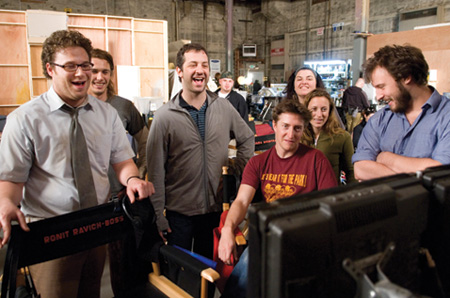
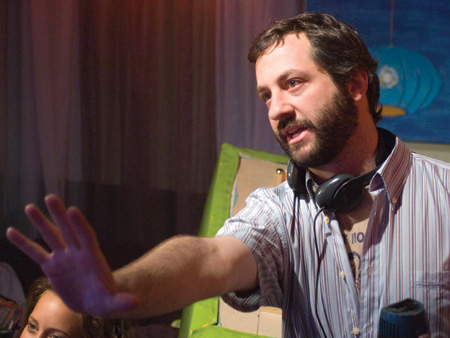 GROUP THERAPY: The core of the Apatow gang has been together for years while new members are added all the time. (Top, left to right) Seth Rogen, Apatow, David Gordon Green and Evan Goldberg laugh at the playback on Pineapple Express. (Photo Credits: (top) Dale Robinette/Columbia Pictures, (bottom) Universal Pictures)
GROUP THERAPY: The core of the Apatow gang has been together for years while new members are added all the time. (Top, left to right) Seth Rogen, Apatow, David Gordon Green and Evan Goldberg laugh at the playback on Pineapple Express. (Photo Credits: (top) Dale Robinette/Columbia Pictures, (bottom) Universal Pictures)
Comedy is at its best," asserts the seemingly ubiquitous Judd Apatow, "when it's in its purest form: when it makes the pain go away."
Take for instance a scene from Apatow's The 40-Year-Old Virgin. Paul Rudd, Romany Malco and Seth Rogen are playing poker afterhours at the electronics store where they work. Each of them recalls in graphic detail his most bizarre sexual encounter, one trying to outdo the other. Then Steve Carell, as the title character, struggles to conceal his sexual naiveté. After an excruciating pause, he compares a woman's breasts to "a bag of sand." At that moment, it's as if he's showed his hand. It's painful to watch but undeniably funny, and quintessential Apatow comedy.
With the three films he's directed—The 40-Year-Old Virgin, Knocked Up and Funny People—a dozen or so he's produced and written, and numerous others he's influenced, Apatow and a group of like-minded filmmakers have eased the pain with a distinctive juxtaposition of raunchy, male-centric bravado and female-friendly emotional warmth. And in the process, they have helped create the dominant style of film comedy today.
Apatow, in short, has revised the playbook for movie humor. His method—letting cameras roll to invite improvisation long after most directors would call 'Cut!'—yields legendary amounts of raw footage and DVDs bursting with extras. It may seem like a system built on anarchy, but he thrives in an atmosphere that several of his peers have affectionately described as "controlled chaos."
"It sounds insane," Apatow admits of his shooting style, "but it's incredibly focused." Grounded, paradoxically, in rigorous prep work, Apatow's improv-heavy technique is bolstered by the familiarity of longstanding collaborative partnerships. Within that safety net, comedic acrobatics can arise, and often do.
One only needs to watch Apatow's trademark "Line-O-Rama" bonus features, which have become a staple in his DVDs, to understand the free-flowing essence of his style. The video outtakes, tantalizing snippets of comic inventiveness, show his actors at their most creative as they substitute jokes—many of them just as hilarious as the ones that end up in the film's final cut.
Like a comedy pied piper, Apatow has been spreading his method by nurturing a prolific team of directors. Almost any filmmaker who's collaborated with him espouses the same philosophy. "The more material you generate, the better," says Adam McKay, who directed on Anchorman, Talladega Nights, and Step Brothers. Nicholas Stoller says while directing Forgetting Sarah Marshall, his mandate from producer Apatow was that "every joke should have at least 10 options," just so long as "the characters have real emotional stakes...and no villians."
Harold Ramis, an improv practitioner himself since his days at SCTV, got to observe Apatow in action when he played a small role as Seth Rogen's father in Knocked Up, and later enlisted Apatow as a producer on his latest film, Year One. "Judd doesn't seem to have an ego about the process." Ramis says. "He'll hire actors who can improvise and he drives them to do it like a whip."
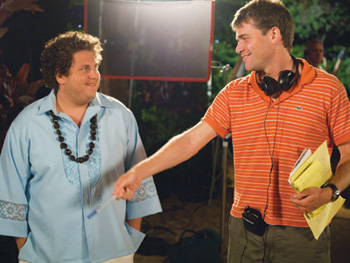 Nicholas Stoller, with Jonah Hill, on Forgetting Sarah Marshall.
Nicholas Stoller, with Jonah Hill, on Forgetting Sarah Marshall.
(Credit: Universal Pictures)Apatow is known for having doggedly maintained collaborative partnerships, a quality that Ramis, among others, credits for the director's continuing productivity. "When people get successful, it's hard for them to start finding time. But Judd is constantly surrounded." Asked if Apatow's system is a kind of factory, Ramis replies, "Absolutely. It's a factory in the Andy Warhol sense."
A number of the directors Apatow has worked with—Jake Kasdan (Walk Hard), Greg Mottola (Superbad) and Stoller—date their association with him from either Freaks and Geeks (1999-2000) or Undeclared (2001-2002), the cutting-edge TV shows on which Apatow was executive producer and occasional director. In the wake of the early and devastating cancellation of both shows, he made a point of keeping those collaborations alive "to try to keep the family together." Perhaps that need for familial cohesiveness as much as anything else—talent, drive, and boundless energy—accounts for his evolution into a successful comedy patriarch. That, and maybe the desire for a little payback: "I've spent my entire career trying to prove two executives wrong who were fired 10 years ago," he says, only half-joking.
By the time an Apatow movie goes before the cameras, he and his cast will have logged and taped at least two table reads (three for his latest film, Funny People). That's an impossible luxury for most directors, but it's much easier to convene your cast when they're also your longtime friends.
Funny People's cast features Apatow's wife, Leslie Mann, (memorable in Virgin and Knocked Up); ex-roommate Adam Sandler (they lived together in the early '90s) and regulars Rogen and Jonah Hill. Among the film's crew are familiar faces: casting director Allison Jones; costumer Debra McGuire; and production designer Jefferson Sage, all of whom have helped create the Apatow look and feel. Not surprisingly, Apatow's loyalty is reciprocated. "We'd all fall on our swords for him," says his longtime 1st AD Matt Rebenkoff.
Kasdan, for one, has been an integral part of Apatow's evolving clan since working as a director on Freaks and Geeks. "The circle expands, but the core always remains," Kasdan says of the Apatow ensemble. Apatow has facilitated a number of directors' professional opportunities by easing their transition to bigger arenas.
Stoller, for instance, was a writer on Undeclared, the same show for which Apatow hired Mottola after seeing his debut feature, The Daytrippers. Apatow brought John Hamburg in for a directing gig on Undeclared after being impressed by his indie film Safe Men. And David Gordon Green, not the most obvious choice to direct the stoner comedy Pineapple Express, nevertheless got hired after Apatow saw All the Real Girls. (Along those lines, Apatow also plans to produce a feature for Once director John Carney.)
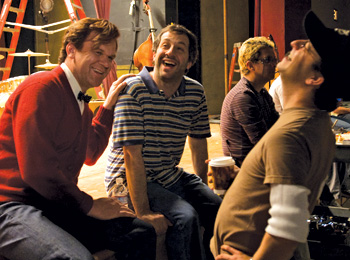 John C. Reilly, Apatow and Jake Kasdan on Walk Hard. (Credit: Gemma L
John C. Reilly, Apatow and Jake Kasdan on Walk Hard. (Credit: Gemma L
a Mana/Columbia Pictures)
As much as Apatow has helped others in their careers, he insists it goes both ways. He's not proprietary about jokes; on the Virgin audio commentary, for instance, he openly credits McKay and Stoller for a couple of comic bits. Even Apatow's friendship with Rogen, his best-known protégé, is, he says, a collaborative two-way street. Plucked from obscurity a decade ago for a part in Freaks and Geeks, Rogen went on to appear in Undeclared and seven Apatow-produced films. "People say I've done so much for Seth," Apatow muses, "but his approach is what makes the films edgier. He and Evan [Goldberg, Rogen's writing partner] are great sounding boards. They're still connected to that part of the audience that go to see our movies."
Like Rogen and Hill, most of the actors Apatow and his fellow directors have used share a certain everyman/underdog quality: Martin Starr, Christopher Mintz-Plasse, and Jay Baruchel, for example, all look like they could have walked in from Ventura Boulevard, not Central Casting. "We've helped to make it possible for the lead characters in comedies to look like normal people, and not necessarily like 'beautiful' people,'" Apatow notes. It's obviously part of the films' appeal. (Who would have guessed that Superbad's McLovin' [Mintz-Plasse] would become one of the poster boys of 2007?)
By assembling his cast months ahead of time and practicing the rhythm and flow of the film, Apatow and his team can address any lulls and generate plenty of alternate material. The table reads and shared discussions that ensue enable Apatow to graft the best elements of directing TV onto the bigger canvas of film. "What's enjoyable about working in television is how enormously collaborative it is," says Kasdan, whereas by contrast, feature directing can seem like "the best job in the world, but it can be incredibly lonely in the process," because so much hangs on the director.
Once filming begins—in the case of Funny People, nine months and several drafts after the first table read—Apatow and crew will shoot at least one take of a scene as scripted. Then, with cameras still rolling, they'll try any number of variations. That usually involves Apatow, Rogen, Goldberg, or another collaborator calling out a line here, a joke there. At a minimum, two cameras are always rolling to ensure adequate cross-coverage for the unscripted moments, and three are not uncommon.
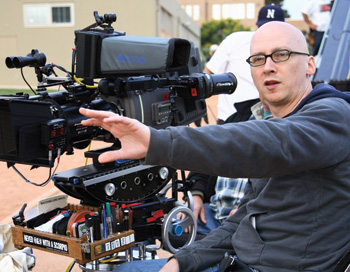 Greg Mottola shooting Superbad. (Credit: Melissa Moseley/Columbia Pictures)
Greg Mottola shooting Superbad. (Credit: Melissa Moseley/Columbia Pictures)
Rather than generating rolls of wasted film, an Apatow project typically ends up as an embarrassment of riches. "Because you know everything you're doing is usable," says Rogen, "it makes it that much more interesting and exciting for an actor, and you're constantly uncovering new things to try throughout the day." On the set, Apatow "gets really caught up in the moment," says Rogen. "He'll act out everything behind the monitor as the scene is playing out in front of him." Apatow, for his part, typically downplays the amount of specific direction he gives his actors.
"When you take the handcuffs off the actors," he says, speaking of conventional practices such as finite takes and prescribed line readings, "it takes the pressure off. It frees them up to try things they haven't tried before, and once in awhile a little magic will occur."
Though his filming style is loose, Apatow says his productions are "buttoned-down" and tightly organized. "We don't sit on the sidelines debating," he points out. "We don't waste energy on production details, and we don't show up and change the plan." Anything spontaneous that happens is meant to do so under prescribed circumstances when the cameras are rolling; it's a controlled shooting environment that's designed to stimulate, produce, and record unanticipated comedic moments.
There are beats in the films so naturalistic they couldn't have been planned: the tiny blood beads that emerge on Steve Carell's freshly waxed chest in Virgin; the backseat fight between sisters (Apatow's own kids) in Knocked Up. That juxtaposition of humor and pain is an element in what his editing team has affectionately dubbed "The Apatow Pause"—the moment in a scene when an audience's discomfort builds almost to its breaking point. It is at that moment that the laugh breaks the tension.
Apatow usually knows what he's looking for. "I'm not a 50-take guy," he says, explaining that he prefers to think in terms of mags, not takes. "I might do four to seven takes, but I like to run out the mag each time. I'm always timing it in my head," a technique borrowed from his TV days. "I direct like I'm shooting video, even though I'm shooting film."
That jazz-like approach, says Apatow, means "everyone is forced to pay more attention, and as a result the scene feels more alive. If the actors are allowed to change the lines at will, they can feel more loose and inspired because they don't feel the pressure to hit every comma. A lot of the great moments in our movies will happen that way."
Take the scene from Knocked Up, for example, when Alison (Katherine Heigl) asks Ben (Rogen) what he thought would transpire on their second date: "BJ," he replies, with flawless comic delivery and without missing a beat. The line wasn't originally phrased that way, Apatow reveals. Initially it read: "I might try to touch your boobs. Over the shirt. And if you showed any interest south of the border, I'd probably try to get a BJ." But because Rogen "was feeling loose and in his groove," Apatow recalls, "he hit it in a really funny, new way."
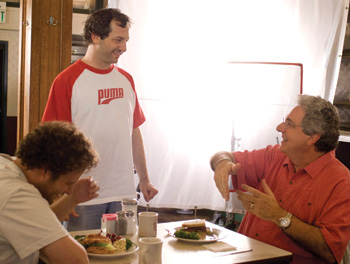 Apatow directing Rogen and Harold Ramis on Knocked Up. (Credit: Universal Pictures)
Apatow directing Rogen and Harold Ramis on Knocked Up. (Credit: Universal Pictures)
Free to invent, Apatow's cast will come up with countless line variations. But having so many possibilities can render it practically impossible to know what will work onscreen, not to mention the fact that Apatow productions log unparalleled quantities of footage (over a million feet on Knocked Up). For Funny People, rumors have swirled that he shot two million feet of film.
"We did not shoot two million feet on this movie," Apatow says with mock indignation. "We shot about 50,000 feet less than two million."
With so much material to choose from, an editor's job can be overwhelming. To curb potential exhaustion during the initial filtering process, he uses two to three editors. The editors may work on alternate versions of a scene and will also help to evaluate each other's selections. In this way, Apatow can take a look at a very rough edit of the film before he's even finished principal photography. None of this would have been possible, of course, without the flexibility afforded by digital editing.
Brent White, a regular Apatow editor since Freaks and Geeks, says, "Judd is constantly looking for the thing that's the most real, and as editors we're trying to build the humor within that realism." Finding the elusive "Apatow Pause" is a balancing act, White explains, because "if you make a scene more funny than it should be, it can take away from the heart of the movie."
Often, Apatow and company won't know what works until they've screened the film with an audience. An advocate of the sneak preview testing process, he will typically screen his film five times for an audience before a film's release (seven in the case of Funny People). Because he's not always sure how a joke will land, he'll try to anticipate whatever change might be necessary later. "The idea," says Stoller, "is that we shoot our re-shoots as we're shooting the movie." In other words: if you spend a little more time and a little more film upfront, you'll save a lot of time later.
In Stoller's Forgetting Sarah Marshall, for instance, it was always planned that Peter (Jason Segel) and ex-girlfriend Sarah (Kristen Bell) would briefly reunite for one night. But how intense the scene should get, and how much an audience would want to see, was difficult to anticipate, since the audience would certainly be invested in Peter's new love interest (Mila Kunis). In order to be prepared, Stoller shot several different versions of the scene and settled on the version that best struck a chord with the audience.
Everybody's job on the set is to make sure the director has gotten everything he needs, explains Apatow. And it's a democratic system, everyone from the DP to the craft services guy is free to suggest a joke. Kasdan agrees: "Judd is constantly open to the idea that you might improve on yourself, or that someone else might have a better idea."
The key to Apatow's approach remains his search for emotional naturalism rather than flashy camera moves. He strives for a kind of directorial transparency. "Style," he says, "should never get in the way of the jokes being able to work."
Of course, one can take that mantra to extremes. When he first began directing, Apatow was afraid to move the camera for fear of creating mismatched takes; he admits to having had "a catastrophic fear of how it would turn out." Consequently, critics have accused him of neglecting the visual aesthetic in his work. (Even that criticism is grist for his humor. In "Directing the Director," a mini-mockumentary on the Knocked Up DVD, Capote director Bennett Miller is dispatched to the set at the studio's behest to school Apatow on the finer points of directing.)
Much of his technique is a carryover from his training in television. Initially a writer and producer on The Larry Sanders Show, Apatow ventured into the director's chair for a single episode and was relieved to find he could rely on his DP to help set up the shots. On Freaks and Geeks and Undeclared, he pushed himself to take on more episodes as a director. "When you're working in TV," he explains, "you don't have time to move the camera. You have so much to do that you can't spend two hours organizing your Technocrane shot, so, as a result of that, I had to create a specific style which was built on speed."
But success brings opportunities. For Funny People, Apatow jumped at the chance to work with Oscar-winning cinematographer Janusz Kaminski. A dramatic comedy with Adam Sandler as a hardened comedian facing his own mortality, the movie is Apatow's passion project and by far his darkest, most tonally complex movie to date. It's a major departure for a guy whose fans expect something akin to Knocked Up, not Terms of Endearment.
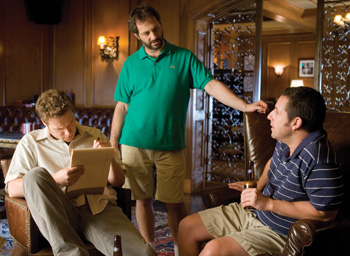 GIVE AND TAKE: Longtime friends Rogen, Apatow and Adam Sandler fine-tune
GIVE AND TAKE: Longtime friends Rogen, Apatow and Adam Sandler fine-tune
a scene in Funny People. (Credit: Tracy Bennett/Universal Pictures)
Prepping with Kaminski, Apatow reflected on the films that inspired him. Together they revisited Lenny, Harold and Maude and All That Jazz. They found ways to integrate more movement into his shooting process. Because of Apatow's predilection for cross-shooting, a DP's bête noire, his lighting options have generally been limited. But he and Kaminski investigated "how to use the camera to feel the feelings of the characters more deeply." Handheld shots and pans, once anathema to Apatow, finally made it into his repertoire with this film. Even the film's visual palette is more nuanced than usual for him.
"Janusz did it way better than I could have done it," says Apatow. What's more, "because I'm a neurotic Jewish guy, I have this constant anxiety that people are going to feel like they're 'slumming' when they work with me. But Janusz was so enthusiastic," as was the entire crew. "It felt like the 1961 Yankees were on this movie. We had the best guy at every job."
Though he freely acknowledges that Funny People is a step into "riskier terrain," he says its blend of pathos and comedy reminds him of Freaks and Geeks, a show that was praised for, among other things, refusing to sell out its story lines or compromise its characters. Paul Feig, who created Freaks, sees Funny People as evidence of Apatow's stylistic growth.
"I think Judd has realized that you can have scenes that don't have to be sheer comedy moments," suggests Feig. "He's been able to blend his comedy shooting style with a more cinematic style for the film's emotional moments."
Feig knows Apatow's work as well as anyone and remembers the dawn of his improvisational style. When Apatow was brainstorming a Freaks episode with Kasdan in which Rogen's character finds himself dating a girl (Jessica Campbell) with ambiguous genitalia, they were struggling with how to handle the scene in which she discloses her condition. So Apatow suggested that Campbell and Rogen come in to work through the scene's emotional beats. "That was a key moment for him," Feig recalls of the first time Apatow used improv in the creative process. "He discovered what a valuable tool it could be."
Apatow concurs. "We did some improv at The Ben Stiller Show [which he produced] and Shandling always rewrote scenes on his feet, but that day was the first time I threw it open to a complete improv as a way of discovering new ways to approach the scene."
In a way, though, that epiphany was years in the making. "When I was a kid the movie Diner had a big effect on me," Apatow recalls, citing the partly improvised dialogue of Barry Levinson's film. "It was the first time I'd heard people talk like that. It felt so real and so funny, and it captured friendship in a way that I hadn't seen before." In retrospect, he says, Diner was highly influential to the rhythms of the dialogue in modern comedy: he points to Seinfeld, Tarantino's films, Swingers and his own work as heirs to that model.
But if Diner was the progenitor of one comedy style, Apatow himself is the antecedent of another. The comedic conventions and naturalistic dialogue of his films are turning up everywhere. A "bromance" like John Hamburg's I Love You, Man, in which Apatow regulars Jason Segel and Paul Rudd explore what it means to be a man, arrived on screens this spring. Although Apatow's name was nowhere on the film, the Internet Movie Database erroneously credited him as one of the producers. The Apatow "brand" has become so prevalent and recognizable, in other words, that his name is now being attached to comedies that bear stylistic similarities to his work. For his part, Hamburg says he's flattered by the association and sees Apatow, who he worked with on Undeclared, as "one of the influences on my style."
Now that Apatow has his choice of projects, he doesn't know what he'll do next. If he's going to direct a film, he says, it will have to be a personal project. "I know I want to direct a movie if it has ideas in it that I feel only I can execute. The story can be fictional but the thoughts and the ideas in it are personal."
At the moment, however, he's exhausted from working on Funny People and says he's fresh out of ideas. "Maybe I'll take a few years off and try to think of another idea. Or maybe I'll direct a movie about Eskimos."
And then Apatow swaps the line, trying another riff to see what will play better.
"Or maybe now is when I direct my thriller."